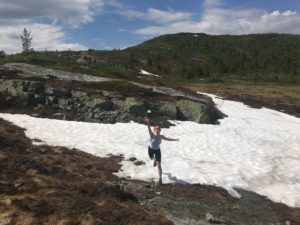 I´m from Oslo, Norway, and I´ve always had an affinity for alpine ecology and the fjords. The fjords are as breathtaking to me as for anyone else who’s never seen them before. I´m studying Ecological and Environmental Sciences at the University of Edinburgh in Edinburgh, Scotland. My scientific interest has always been the ocean and marine species. I aspire to work in wildlife conservation of marine species, potentially battling the illegal wildlife trade and legal issues surrounding the protection of biodiversity. But so far I’m enjoying everything ecology and biology has to offer, ranging from plants to insects, alpine to fjord.
I´m from Oslo, Norway, and I´ve always had an affinity for alpine ecology and the fjords. The fjords are as breathtaking to me as for anyone else who’s never seen them before. I´m studying Ecological and Environmental Sciences at the University of Edinburgh in Edinburgh, Scotland. My scientific interest has always been the ocean and marine species. I aspire to work in wildlife conservation of marine species, potentially battling the illegal wildlife trade and legal issues surrounding the protection of biodiversity. But so far I’m enjoying everything ecology and biology has to offer, ranging from plants to insects, alpine to fjord.
For the internship with RECITE so far I´ve been participating in the FunCaB project in the field and the INCLINE project in the lab. The first three weeks were spent in the field with technician Linn, Leire from Spain, Sonya from New Zealand and Alexander from Norway. For FunCaB we were investigating the role of different plant functional types (graminoids, forbs and bryophytes) in ecosystem functioning. The objectives are to assess climate change impact on alpine plant communities, and the effect of temperature and precipitation on the composition of the functional groups. Our task in the field was to do removals of all the different combinations of the plant functional types at each site.
The final week of July was spent in the lab with Leire, Regine and Elia sorting biomass for INCLINE and some other projects. We also weighed dry plant biomass to establish seedlings root:shoot ratios for two different alpine species for drought and water potential purposes. It was interesting to learn how the two different species invest in above ground biomass or below ground biomass. We were also introduced to Dagmar, Joshua and some more of the people who are organising these projects. We got to try some very sensitive balances for the weighing, and to see how it works when you dry plant biomass.
I was truly excited when I got the internship because my goal was to gain relevant work experience in ecology and environmental science. So far I’ve gotten a lot of new knowledge which I wouldn’t have had access to otherwise, as well as a taste for the life of a scientist. Also working in the mountain regions have prepared me for fieldwork and data collection in the years to come. How to prepare for the weather and keep samples organised.
Field Ecology at the University of Edinburgh prepared me for plant identification and fieldwork outside for several hours. The internship with RECITE definitely improved my identification skills; separating forbs, graminoids and bryophytes and how some of them can be very similar but actually belong to another functional group. I also learned that always remember proper rain gear when out in the field! Don´t forget your rain pants even when they are hanging to dry in plain sight. Shoutout to Linn and Sonya for having extra raingear in case there are some whimsical interns (me) there.
Volunteering for Toby Samuels in the lab at the University of Edinburgh was where I was first introduced to the very repetitive work as a scientist in order to accumulate enough data for data analysis. I was also introduced to plotting massive amounts of data into excel, and how data is often coded according to treatment groups. This was similar to what I was doing when weighing the alpine seedling roots and shoots at the end of July for the internship.
Luckily, the COVID19 pandemic hasn’t disrupted my learning or experience during the internship. I´ve felt safe and comfortable both out in the field and in the lab. Overall my experience has been very fulfilling, where I’ve gotten to know some passionate and wonderful people. Some highlights from the field have included making a snowman, preparing dinners together, listening to road-trip songs, seeing reindeer and eating ice cream on the final day. Having a lunch break on the rooftop of the biology building in the sunshine was the perfect way to end my week in the lab. I’m thrilled to go back in the field for August and insect herbivory!
Very nice blog, Eira, and I am glad to hear there were extra rainpants around when needed… Science is repetitive some times, and collecting data is really hard work that takes both patience and atteention to detail. Nice to hear you see the value of these skills, and enjoyed the experience. And snowman, obviously!